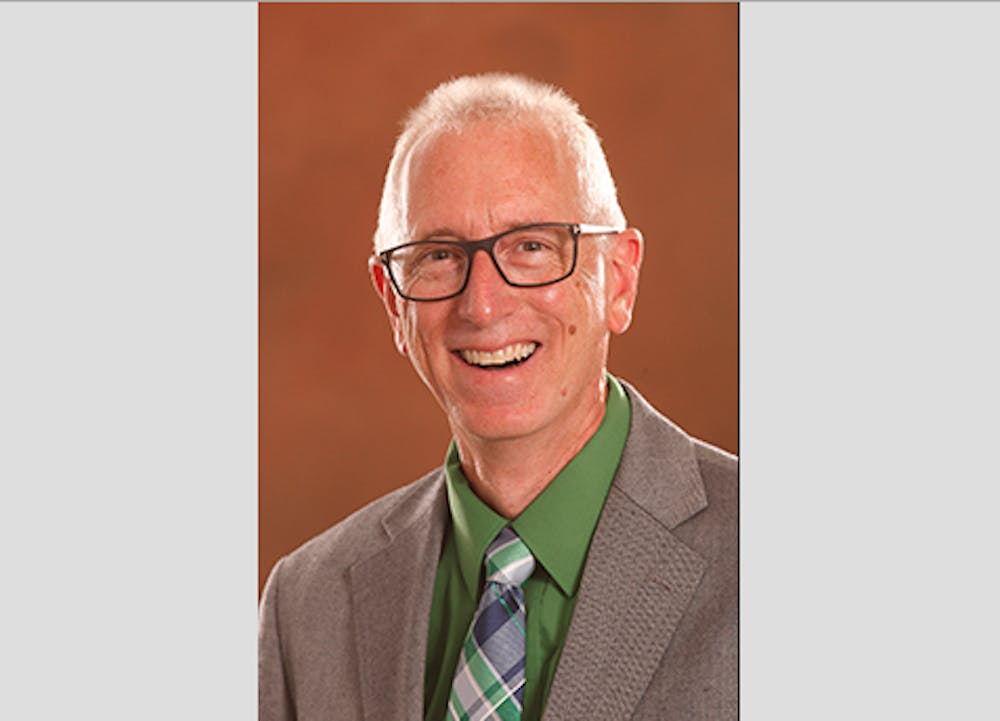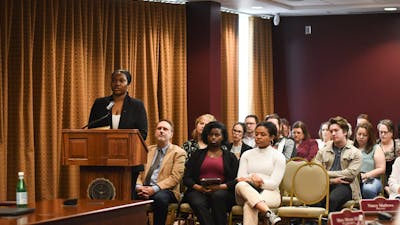Faculty member chosen to advise Michigan governor

Gov. Rick Snyder appointed a Central Michigan University environmental science professor to be one of nine members on the Environmental Science Advisory Board.
The advisory board, created by Michigan Act 269, is a new addition to state government. The act was approved by Snyder on June 28, 2018, and created within the Michigan Department of Technology, Management and Budget.
Section 2609 of the act states, “the board shall advise the governor and any state office, agency, or department specified by the governor on issues affecting the protection of the environment or the management of natural resources of this state. The board’s duty to provide advice is limited to the specific advice requested from time to time by the governor.”
Lawrence Lemke, professor of hydrogeology, environmental modeling and geo-statistics is one of the newest additions to the board.
Lemke has been studying and researching the presence and transportation of contaminants that are in the underground water, soil and air for 15 years. He has been the chair of the CMU Department of Earth and Atmospheric Sciences for three years.
Lemke said that he was nominated for a seat on the board and applied to the seat afterward.
“I was so excited when I first heard that I was appointed to the board,” Lemke said. “It’s going to be good science leading to better environmental policies. This board allows good scientists, like myself, to contribute to sound environmental decision making.”
Lemke said although he hasn’t attended a meeting yet, the board usually meets between six to eight times per year, depending on when the governor calls a meeting. During the meeting, the only topic being discussed will be the one that the governor called the meeting for.
Each member of the board is required to have an expertise in one or more of the following studies:
- Engineering
- Environmental science
- Economics
- Chemistry
- Geology
- Physics
- Biology
- Human Medicine
- Statistics
- Risk assessment
Lemke believes his past research and ongoing research of tracking contaminants in water, soil and air, and the effects it has on human health, could be a valuable asset to the board.
“I believe my research can help because I’ve spent so many years doing it,” Lemke said. “I’m able to identify what kind of contaminants are in underground aquifers, or if there are harmful metals in the soil that are getting into the crops.”
Along with Lemke’s research, he is an environmental modeler. This means that through research he is able to map out the distribution of contaminants, including metals in the soil and dust or pollution in the air. He is also able to create models of environmental conditions that will affect other environments in the future.
Lemke said one issue that he would like to address is the presence of per and polyfluoroalkyl substances (PFAS) in more than 30 Michigan locations. A recent water quality report in August 2017 showed that Mount Pleasant was one of those locations.
According to a Central Michigan Life article about the local PFAS contamination, it's a type of chemical in the PFAS family that has been used to make a variety of products including fire suppression systems and products by Teflon and Scotchgard.
The U.S. Environmental Protection Agency reports long-term exposure to PFAS can cause pregnancy complications, liver damage, thyroid disease and cancer.
According to the article, the contaminated site in Mount Pleasant is no longer in use, but many locations in Michigan might still be contaminated.
“I think worrying about our Great Lakes is important as well, but I feel that we need to get a handle on cleaning our water and focusing on water quality the most,” Lemke said.
Lemke and the rest of the board will advise the governor-elect Gretchen Whitmer. Lemke’s term on the board will end in 2020.







